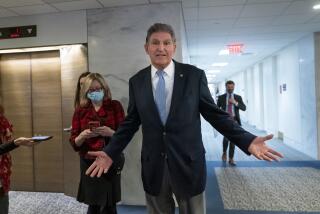Brady Bars Shifting Third World Debt Risk to Public
- Share via
WEST BERLIN — Nicholas F. Brady, in his first speech as U.S. Treasury secretary, today firmly rejected any sweeping plan for easing the Third World debt crisis that shifts risk from private banks to the public sector.
The remarks were a sobering reminder to advocates of debt relief that the Reagan Administration is unwilling in its final months in office to veer from the case-by-case debt strategy mapped out by Brady’s predecessor, James A. Baker III.
“If we embark on a course that involves the transfer of risk from the private to the public sector, a true and lasting solution to the restoration of sustained growth among debtor nations will have escaped,” Brady told the annual meeting of the International Monetary Fund and World Bank.
Brady spoke shortly after Japan’s central bank governor, Satoshi Sumita, unveiled a long-awaited plan to ease the debt burden of middle-income countries such as Brazil.
Plan Has Been Modified
Sumita, aware of U.S. qualms about the initiative, stressed that it should be implemented in such a way that governments or international organizations do not end up taking over responsibility for commercial banks’ loans.
Brady, who took office earlier this month, did not refer specifically to the Japanese plan, which has been modified since it was first floated in June to take account of some U.S. objections.
But he said the United States regards with skepticism proposals that may appear to conform to the basic principles of the existing, market-oriented debt strategy but which in practice would produce only an illusion of progress.
Indeed, such plans would make the debt problem intractable by weakening the IMF and the World Bank, undermining economic reform efforts in the Third World and spurring political opposition among taxpayers in creditor countries, Brady said.
‘For What They Are’
“We must see proposals for what they are, not for what they purport to be,” the former New York investment banker said.
Brady touched only briefly on the world economy and the dollar.
He said the success of industrial countries in containing inflation and reducing global trade imbalances means that prospects are excellent for sustaining low-inflationary growth and stable exchange rates.
Brady said industrial nations need to reduce trade imbalances further and assured America’s trading partners that additional cuts will be made in the U.S. budget deficit.
More to Read
Get the L.A. Times Politics newsletter
Deeply reported insights into legislation, politics and policy from Sacramento, Washington and beyond. In your inbox twice per week.
You may occasionally receive promotional content from the Los Angeles Times.










